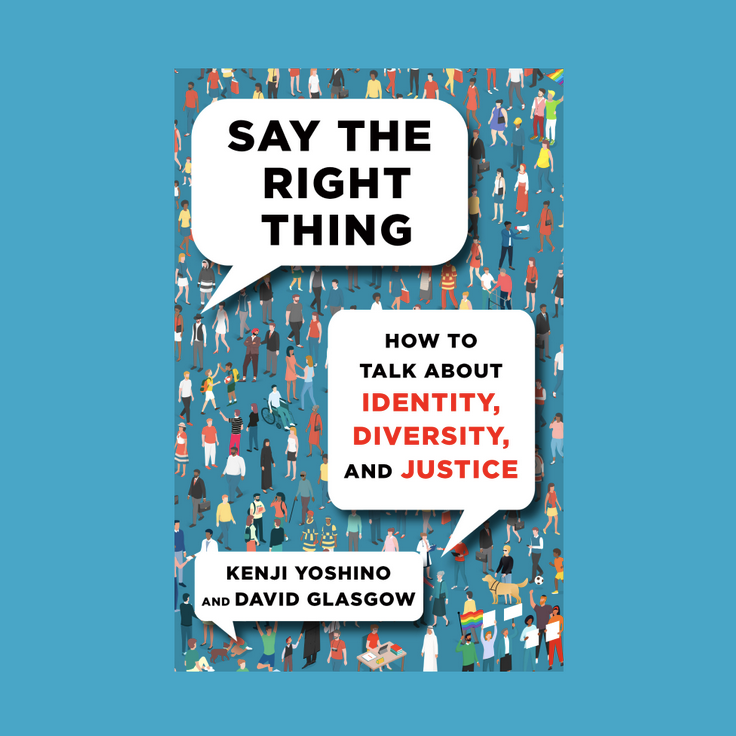‘Say the Right Thing’ by Kenji Yoshino and David Glasgow: Rules for better identity conversations
Yoshino, K. & Glasgow, D. (2023). Say the Right Thing: How to Talk About Identity, Diversity, and Justice. Atria Books.
By Kevin J. Delaney, reprinted from charter
Conversations about race, gender, sexual orientation, and other aspects of individual identity are arguably more common in workplaces today than in the past. Many people aren’t equipped for them, or are worried that they’ll misstep.
In their new book out this week, Say the Right Thing, Kenji Yoshino and David Glasgow of NYU School of Law aim to provide a simple playbook for people from dominant groups to be better allies to colleagues and friends who are less advantaged.
“We believe the work of civil rights is being done…in rooms like your classroom, your break room, and your living room,” write Yoshino and Glasgow, who co-founded the Meltzer Center for Diversity, Inclusion, and Belonging at NYU Law. “As you enter identity conversations, we want you to think of them as moments when you use your moral agency in the domains in which you have power. This is the work of civil rights only you can do.” (p. 178)
Yoshino and Glasgow, who bring the lived experience of being an Asian-American gay man and a white gay man, offer seven principles for improving the quality of your conversations about identity:
- “Beware the four conversational traps.” The traps are avoiding, deflecting, denying, and attacking. They often involve reacting reflexively to someone raising an issue of bias or discrimination and prioritizing managing your own discomfort. Examples include focusing on how someone raised the issue—for example, that it was rude or emotional—rather than what they said. “To be an ally, however, requires you to make an effort to move from a reflexive response to a reflective one,” the authors write. (p. 32)
- “Build resilience.” Manage any emotional discomfort of conversations related to identity by trying to understand why you’re uncomfortable and treating mistakes as opportunities to learn. If “you acknowledge you’re a ‘good-ish’ person who falters like everybody else, you’re less likely to see mistakes as judgments of your character,” write Yoshino and Glasgow. (p. 39) They advise adding the word “yet” to any self-criticism, such as “I’m not good at talking about race, yet.” (p. 41)
- “Cultivate curiosity.” “Adopt a learning posture by listening generously to the other person’s perspective and sharing your own perspective tentatively, such as by using ‘I’ statements and speaking in drafts,” write Yoshino and Glasgow. (p. 81) “Speaking in drafts” means signaling you have an open mind by using phrases such as “I think…” or “I wonder…” (p. 74) In one of the strongest sections of the book, the authors recommend that people in dominant positions adopt the working hypothesis that when there’s a gap in perspectives, it’s they who don’t understand. “When you hold more power in society, you don’t need to know much about less powerful groups to live comfortably, so there’s no built in incentive to learn,” they write. “Now, however, you have a new incentive—to be a good ally. And good allies exhibit curiosity.” (p. 65) Yoshino and Glasgow provide a framework for educating yourself while not over-burdening people impacted by bias when asking them to teach you about their identity.
- “Disagree respectfully.” Disagreements related to identity might have different weight for different people—you might consider something an intellectual policy discussion, while for someone else it threatens their personal sense of belonging and equity. Explicitly acknowledging that makes a difference. Also, “look for points of agreement and share points of disagreement in detail,” Yoshino and Glasgow advise. (p. 95) They cite behavioral scientist Xuan Zhao’s finding that beginning a response to someone’s point of view with “Thank you, because…” makes them feel heard more than just “I hear you.”
- “Apologize authentically.” When you’ve made a mistake, this means acknowledging the harm and expressing contrition, taking responsibility for it, and taking action to correct it.
- “Apply the Platinum Rule.” The Platinum Rule goes a step further than the Golden Rule of treating others as one wants to be treated. “The Platinum Rule enhances the Golden Rule by urging you to help others as they would wish to be helped,” write Yoshino and Glasgow. “It reminds you to take the other person’s preference seriously, whether by asking directly or by carefully reflecting on their needs.” (p. 132)
- “Be generous to the source.” Faced with bias, the authors recommend not reflexively assuming malicious intent. “You should be an ally to the source of non-inclusive behavior because someday the source will be you,” they argue. (p. 153) They recommend showing that you’re learning, too, and offer a menu of responses for challenging bias to have at the ready, such as “I think you’re so much better than that comment.” (p. 165)
To be sure:
- The advice is geared toward individuals from dominant groups who want to be more inclusive. “We believe the greatest need is for individuals in higher power positions to improve how they engage in identity conversations,” the authors write. (p. 10) They point to the intersectionality of bias and discrimination, noting that “everyone has baskets of advantage and disadvantage.” “Our focus on people with more power isn’t as limiting as it may seem,” Yoshino and Glasgow contend. “Everyone is in the ally position at times, and everyone benefits from the allyship of others.” (p. 11)
- The book focuses largely on interpersonal scenarios and less on broader structural fixes for racial, gender, or other inequalities.
- The authors acknowledge that the term “ally” can seem less active and more superficial than alternatives such as “upstander” and “advocate,” but say they use it because it’s the “still by far the most common term to describe both the ‘do no harm’ and ‘do good’ forms of support.” (p. 129)
Notable quotes:
- “We welcome the democratization of discomfort. It jolts people to wake up to the inequities in their communities and rise to challenge them.” (p. 5)
- “The people we most admire in our field are those who combine compassion and rigor—who have the softest of hearts and the hardest of heads.” (p. 13)
- “We’ve seen again and again that silences can find words, that words can become conversations, and that conversations can change lives.” (p. 14)
- “In a free society, we think it’s essential that people have the ability to air disagreements on issues of identity, diversity, and justice. We also think such freedom comes with a moral responsibility to speak with care.” (p. 102)
- “Apologies make you acutely vulnerable. What if you admit error and your conversation partner takes the opportunity to pile on? What if your apology exposes you to public shaming or a lawsuit? What if you’re forced to see something about yourself you didn’t want to see?” (p. 107)
- “Allyship is more like a game of musical chairs. Some days you’re the ally, some days you’re the affected person, and some days you’re the source. In fact, you can cycle through all three positions in a single day.” (p. 154)
- “It’s possible to ‘hold people accountable for wrongdoing’ while remaining ‘in touch with their humanity enough to believe in their capacity to be transformed.’” —the authors citing feminist scholar bell hooks (p. 156)
The bottom line is that Say the Right Thing is a helpful guide for the person who wants to engage in discussions and situations related to identity but doesn’t want to hurt others or be canceled themselves. It’s particularly good at explaining how people from advantaged groups tend not to perceive identity dimensions that less-privileged individuals experience, and how to best overcome that dynamic.
We also recommend Did That Just Happen?! by Dr. Stephanie Pinder-Amaker and Dr. Lauren Wadsworth, which covers similar ground and is focused more squarely on workplace scenarios. The “Empowered Listening” approach it details is critical reading for every leader who wants to create more diverse and inclusive teams.
You can order Say the Right Thing at Bookshop.org or Amazon. (We may earn a commission if you purchase a book through these links.)
To access this resource, please click here.










